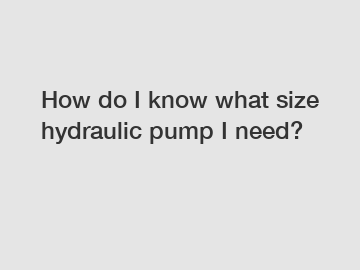How do I know what size hydraulic pump I need?
How do I know what size hydraulic pump I need?
When it comes to selecting the right hydraulic pump size, several factors need to be considered. The size of the hydraulic pump is crucial as it directly impacts the efficiency and performance of the hydraulic system. To determine the appropriate pump size, one must take into account the fluid requirements, operating conditions, and desired output.
To begin with, you need to identify the fluid requirements of your system. This includes the flow rate and pressure required to operate the hydraulic equipment. The flow rate refers to the volume of fluid that needs to be pumped per unit of time, while pressure refers to the force exerted on the fluid. These parameters can vary depending on the application and the type of machinery being used.

Once the fluid requirements are established, the next step is to consider the operating conditions. This involves assessing the working environment, temperature, and load demand. Any variations or extreme conditions should be taken into account, as these factors can affect the performance and longevity of the hydraulic pump.
After determining the fluid requirements and operating conditions, it is essential to calculate the total system horsepower. This can be done using a horsepower formula that considers the flow rate, pressure, and mechanical efficiency. By multiplying the flow rate and pressure, and dividing the result by the mechanical efficiency, one can obtain the required horsepower for the hydraulic system.
It is important to note that the mechanical efficiency factor plays a significant role in determining the pump size. Mechanical efficiency refers to the actual output power obtained compared to the theoretical power calculated. Factors like friction, leaks, and losses in the system can reduce the mechanical efficiency. Therefore, it is crucial to consider these factors when selecting a hydraulic pump to ensure optimal performance.
Choosing the proper size hydraulic pump not only ensures efficient operation but also has several other implications. An oversized pump can lead to excessive energy consumption, increased system wear, and higher costs. On the other hand, an undersized pump may not provide sufficient flow or pressure, resulting in a reduction in productivity and potential damage to the system.
In conclusion, determining the appropriate size for a hydraulic pump involves considering the fluid requirements, operating conditions, and calculating the system horsepower. Taking into account variations, losses, and efficiencies are essential to obtain accurate results. Selecting the right size hydraulic pump is crucial for optimal system performance, energy efficiency, and overall cost-effectiveness.
If you want to learn more, please visit our website ec460b hydraulic main control valve for sale, kubota engine exporter, caterpillar sbs80 hydraulic pump.


